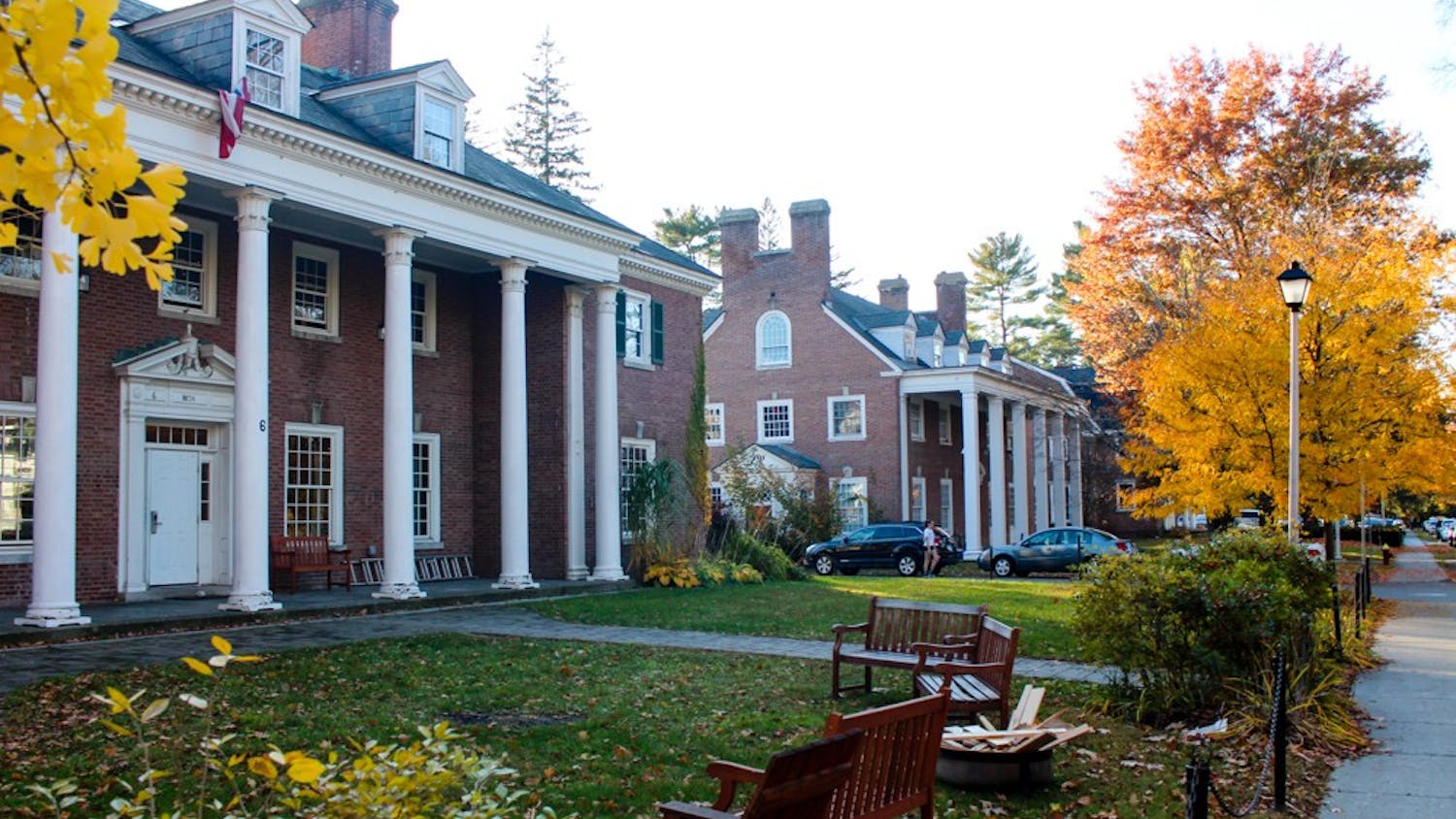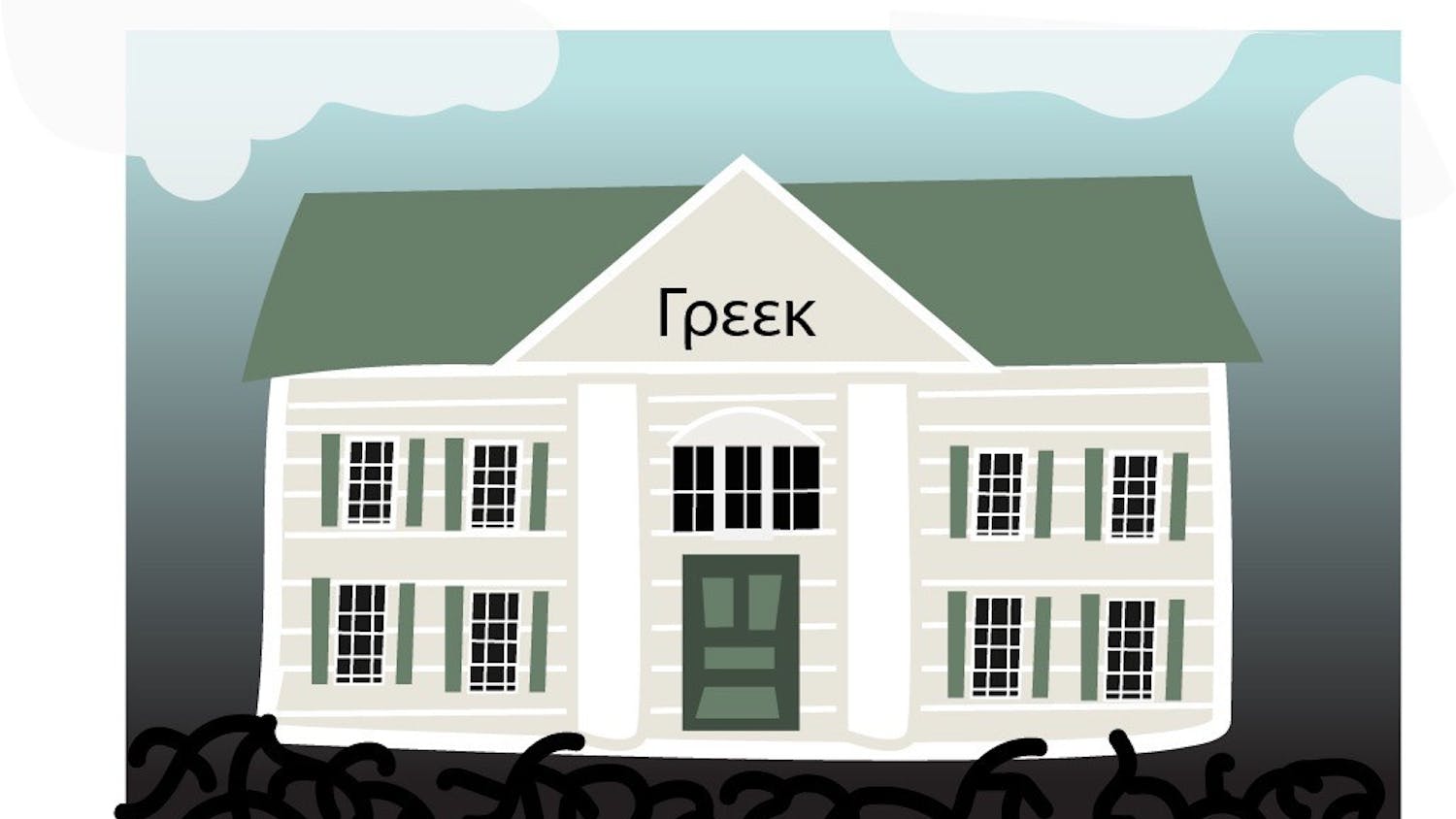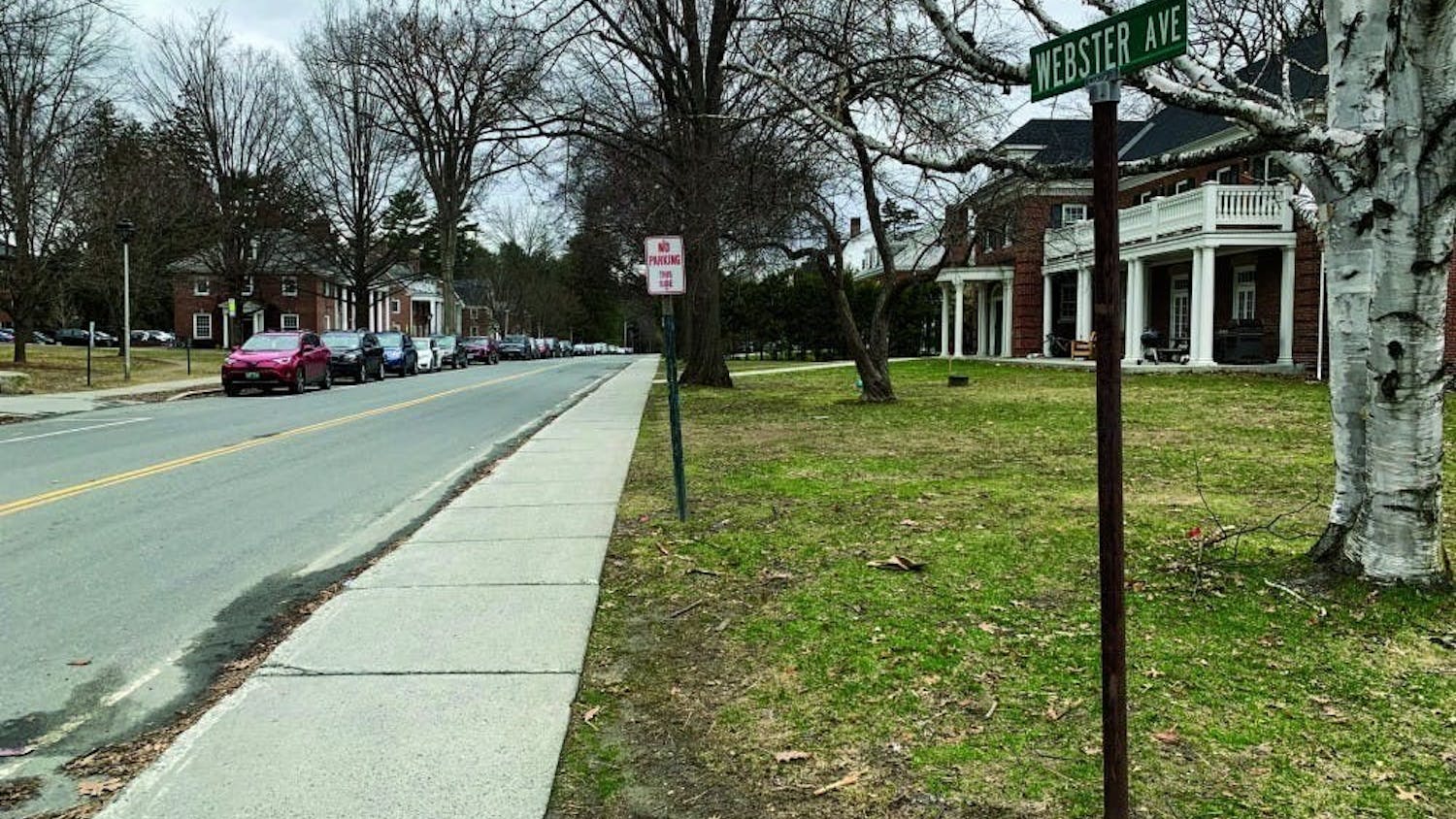Over the past few weeks, Dartmouth sororities and the Inter-Sorority Council have begun examining how their bylaws include or exclude non-binary students. As of now, non-binary and gender non-conforming potential new members interested in joining sororities would have to visit all eight houses during formal rush — a requirement for all PNMs — despite some house bylaws potentially restricting them from joining.
Epsilon Kappa Theta president Megan Ungerman ’21 expressed concern over the implementation of this policy, asking, “How can you force someone to go to some house that they're not going to be accepted into?”
ISC vice president Megan Zhou ’21 wrote in an email statement to The Dartmouth that all PNMs must attend parties at all eight sororities during the rush process, but the ISC is having “continuous conversation to try and create a fair process for everyone.”
Currently, just one sorority at Dartmouth — EKT — has bylaws that explicitly accept non-binary and gender non-conforming individuals. Other sororities’ bylaws only state that they are permitted to extend membership to self-identifying women, although some of these houses may have informally allowed any non-male students to join.
After a series of emails and meetings between the ISC and sorority presidents, the ISC has asked Dartmouth sororities to discuss their own house policies regarding non-binary PNMs.
ISC sends mixed messages
The discussion started during the first week of spring term, when Ungerman expressed concern in a survey administered by the ISC to sorority presidents about the ISC's usage of language that was not inclusive of non-binary or gender non-conforming people. For example, Ungerman said that the ISC refers to its members as “sisters” during ISC meetings.
Ungerman also voiced concern to the ISC over the lack of gender-inclusive wording on a ISC slideshow presentation created for PNMs. Although the ISC’s campus-wide emails say that formal recruitment is open to anyone who is “a self-identifying woman or gender non-conforming or non-binary person,” Ungerman noted that there was no gender-inclusive language in the presentation.
Ungerman’s concern sparked several conversations about the inclusion of non-binary and gender non-conforming students in formal recruitment between Office of Greek Life program coordinator Jessica Barloga, ISC president Mahalia Dalmage ’21 and Ungerman.
On April 28, Dalmage emailed sorority presidents saying that “the ISC has decided to uphold the current bylaws which state that we are open to self-identifying women,” adding “these are not new bylaws, these are the ones that have always been in place.” The email did not indicate that non-binary or gender non-conforming individuals were permitted to participate in formal recruitment.
Ungerman said that after the initial email, there was “worry” among some sorority presidents and members “that non-binary people woud be excluded from the ISC,” which Ungerman described as “sad” because there are already non-binary people in EKT.
Dalmage’s email seemed to contradict the ISC bylaws, last amended on April 8. ISC bylaws state that “any Dartmouth undergraduate who identifies as a woman and/or gender non-conforming person may participate in Formal Recruitment, as long as the person does not self-identify as a man.”
A day later, on April 29, the ISC executive board clarified its stance in a second email to sorority presidents and inclusivity chairs. The message stressed that “people who identify as gender non-binary or gender non-conforming can participate in the formal recruitment process.”
Despite the conflicting stances presented in the emails, the ISC maintains there were never any changes to the ISC bylaws. Zhou acknowledged in an email statement to The Dartmouth that Dalmage’s original April 28 email “may have been confusing to some due to poor phrasing.”
The second email also added that while non-binary and gender non-conforming students are welcome to participate in rush, the National Panhellenic Conference states that it aims to “promote and advance the common interest of women’s-only sororities.” The NPC is the nationwide umbrella organization that hosts Dartmouth’s chapters of Alpha Phi, Alpha Xi Delta, Kappa Delta and Kappa Kappa Gamma sororities.
The ISC wrote that consequently, despite the ISC’s inclusion of non-binary and gender non-conforming members in its bylaws, national houses at Dartmouth are “restricted to extending membership to only self-identifying women.”
Local houses are not restricted by the same bylaws as national houses. According to the ISC, membership processes for local houses are at each chapter’s discretion.
Bylaw confusion continues
However, discrepancies in — and confusion around — ISC and individual sorority bylaws remain.
Zhou wrote that houses that do not accept non-binary PNMs are not in violation of the ISC recruitment policy regarding non-binary people, as the ISC controls who can participate in recruitment, not who can be accepted into each house.
That said, Zhou stated that the ISC does not want PNMs to “falsely believe membership is attainable at all houses.”
She added that the ISC “cannot directly conflict or discredit existing national policies.”
According to current local sorority bylaws, Chi Delta, Kappa Delta Epsilon and Sigma Delta are permitted to extend membership to self-identifying women but do not explicitly state that they are open to non-binary and gender non-conforming members. EKT extends membership to women, non-binary and gender non-conforming people.
While national chapter wording varies, most include only self-identifying women.
The national chapter of Kappa Kappa Gamma states in its bylaws that “[e]ach chapter of Kappa Kappa Gamma has the final choice of its own members,” but also uses the word “women” when describing the organization. The national chapters of Alpha Phi, Alpha Xi Delta and Kappa Delta all use the word “women” when referring to the organization members as well.
Sororities consider bylaw changes
As a result of Ungerman’s initial concerns and other conversations among sorority presidents and the ISC, the ISC has directed houses to have discussions about their policies around gender and membership.
Gigi Gunderson ’21, president of Sigma Delt, said that “Sigma Delt has always been open to self-identifying women, gender non-binary and gender non-conforming folks, to the best of our exec board’s understanding.”
Although this language is not in the official Sigma Delt constitution, Gunderson said that the house is “actively” reviewing its bylaws as a result of the ISC directive, planning discussions and aiming to vote on whether to change the language in its constitution to explicitly allow all non-male identifying individuals to join the house.
Following an online form sent to its members and a house-wide Zoom discussion on the issue, KDE members are voting on whether or not to change wording in their constitution. The vote closes on Saturday.
Despite conversations starting within some local houses, national sororities may remain bound by national policy.
Ungerman said that since it is clearly in the ISC bylaws that gender non-conforming people are welcome to rush, all sororities should strive to do what they can to welcome non-binary students in the future.
Ungerman acknowledged that “there are real concerns” with the national chapters having to abide by national policies, but said that the ISC should not “hide behind this idea that it’s the national chapters that won’t let [Greek life] be inclusive.”
President of local sorority Chi Delt Isabella Frohlich ’21 declined to comment on the issue, citing ongoing conversations within the house. The president of local sorority KDE Jada Brown ’21, as well as the presidents of national sororities — APhi president Bruna Decerega ’21, AXiD president Hayley Divers ’21, Kappa president Caroline Smith ’21 and KD president Svetlana Riguera ’21 — did not respond to multiple requests for comment.
As of now, non-binary and gender non-conforming students interested in joining sororities will have to visit all eight houses should formal recruitment occur normally this fall, despite some house bylaws potentially restricting them from joining.
While acknowledging the complexity of the issue, Ungerman stressed that it is likely that anyone who opts to go through the rush process “feels like they belong in a sorority.” Ungerman added that having non-binary people go through a different rush process as a result of certain houses not being open to them might be “othering.”
Ungerman emphasized the importance of having conversations about gender inclusivity within houses and throughout the ISC in order to work towards creating a more inclusive environment.
“When you humanize the problem, it’s not as big as a problem as some people are making it,” Ungerman said.
Zhou wrote that the ISC “encourages houses to have these important conversations as soon as possible.”
Alumni reflect on Greek life inclusivity
Although the topic has come to the forefront this term, gender inclusivity in Dartmouth’s sororities has been an issue for decades.
Valerie Price ’88 founded Alpha Beta — a sorority which no longer exists at the College — while at Dartmouth. She said that “the vocabulary used to define people’s gender was not even in existence” when most national sororities formed, adding that it is “strange” and unreasonable that people would rely on bylaws that could have been written at a time when gender inclusion was not a well-known issue.
When Dartmouth informed Price after 15 months that Alpha Beta had to affiliate with a national chapter in order to stay recognized and get funding, Price said that Alpha Beta affiliated with the national sorority Delta Gamma because it was the “least racist,” though “still not that great.”
Although she noted that there were often things in bylaws that she didn’t agree with, the College did not allow any local sororities at the time, despite several local fraternities existing, essentially forcing sororities to comply with national rules.
President of Dartmouth’s LGBTQIA+ alumni association D-GALA Mel Pastuck ’11 acknowledged the importance of female-dominated environments, but she said that she would “challenge [the ISC and sororities] to open their minds” to ask where non-binary people might find community.
She said that if by finding their own community, sorority members dismiss others trying to do the same, it is like “the pot calling the kettle black.” Pastuck said that being involved in a sorority at Dartmouth helped her “challenge and explore [gender roles] rather than affirm them.”
She said that welcoming non-binary people creates an “environment that is truly open and can explore what gender roles mean.”
A former Sigma Delt and OPAL student intern for the LGBTQ community, Pastuck said that while sororities typically “propagate traditional gender roles,” her experience with a diversity of views at Sigma Delt “helped people write their own story about what it means to be female identified.”
Over the decades, some sororities have chosen to “go local” and disaffiliate from their national chapters, often due to disagreements between local members and the national chapter. Sigma Delt — the first sorority to go local in 1988 — went local because “[s]isters and alumnae felt there were irreconcilable differences between the Dartmouth chapter and Sigma Kappa National, specifically religion in rituals and an emphasis on men in National songs and overall attitudes,” according to its website.
Amanda Rosemblum ’07, co-vice president of D-GALA, encouraged sororities restricted by national chapter rules to go local.
“If national sororities are limiting what the students want to do on campus, those students should be creating local chapters,” Rosenblum said, adding that EKT — of which she was a member as an undergraduate — did so nearly 30 years ago.
Rosemblum said that she found it “pretty shocking that these are still conversations” 15 years after her time at Dartmouth.
Correction appended (May 15, 2020): A previous version of this article stated that Ungerman raised concerns about language used in an PNM powerpoint through a survey administered by the ISC. The article has been updated to reflect that Ungerman’s concerns about the PNM powerpoint came after the ISC survey was administered. A previous version of this article also quoted Ungerman as saying that national chapters should not “hide behind this idea that it’s the national chapters that won’t let [Greek life] be inclusive.” The article has been updated to reflect that Ungerman was referring to the ISC, not national chapters.
Correction appended (Nov. 16, 2020): A previous version of this article indicated that Price is a member of the Class of 1987. The article has been updated to reflect that she is a member of the Class of 1988.




